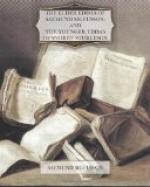DELLINGR—a day-ling. with the dawn, daybreak.
DIS, pi. DISIR, it originally sig. a female, but was afterwards used in the sense of Nymph and Goddess. It enters into the composition of several female names, as Thordis, Freydis, Vegdis, &c.
DOLGTHRASIR: a dolgr, a warrior; contentious, obstinate, persisting, from the v. thrasa, to litigate, to quarrel.
DRAUPNIR, from the v. drupa, to droop, or the v. drjupa, to drip.
DROMI, strongly binding.
DUNEYRR, a hollow sound, from the v. dynja, to sound, to resound.
DURATHROR. The first sylb. may be derived either from dur, a light sleep, or from dyr, a door; and the last, either from the v. threyja, to expect, to wait for; or from throa, to increase, to enlarge.
DURINN, prob. from dur, a light sleep, to fall asleep; whence prob. the E. to doze, and ph. also dusk.
DVALJNN, from dvali, sleep.
EIKINSKJALDI, furnished with an oaken shield, scarlet oak.
EIKTHYRNIR. Eik is the ilex or scarlet oak; thyrnir, a thorn; metaphorically for a stag’s antlers.
EINHERJAR, a hero; select, chosen heroes.
EIR, to befriend, to tranquilize.
ELDHRIMNIR: eldr, elementary flre: brim, congealed vapour, rime, also soot; hence (a kettle) sooty from flre.
ELIVAGAR, stormy waves; a storm; the sea; an estuary; water; wave.
ELLI, old age.
ELVIDNIR, ph. from el, a storm; and vidr, wide.
EMBLA. The etymologies of the name of the first woman given by the E.E. are merely conjectural. Grimm says the word embla, emla, signifies a busy woman, from amr, ambr, amil ambl, assiduous labour; the same relation as Meshia and Meshiane, the ancient Persian names of the first man and woman, who were also formed from trees.
FALHOFNIR, a nail, a lamina, hoof.
FARMAGUD, the God of Carriers and Sea-farers.
FENRIR, FENRIS-ULFR, may mean dweller in an abyss, or the monster wolf.
FENSALIR, lit. Fen-saloon, from fen, a fen, but which it would appear may also be made to sig. the watery deep, or the sea; and salr, a hall, mansion, saloon. See Valhalla.
FIMBUL. From fimbulfambi comes the E. provincialism, to fimble-famble; and the D. famle, to stammer, to hesitate in speaking.
FIMBULTHUL. Thulr means an orator or reciter, to speechify.
FIMBULVETR: vetr, winter; according to Grimm’s explanation of fimbul, the Great Winter.
FJALARR and FJOLNIR. Multiform: in composition fjol, many.
FJOLSVIDR or FJOLSVITHR, to scorch: or ph. from svithr, wise, powerful, potent, strong.
FJORGYN. Grimm, we think, has satisfactorily shown that fjorg is the G. berg, a mountain.
FOLKVANGR, lit. the folk’s field, or habitation.
FORSETI, lit. the Fore-seated, i.e. the Judge.




